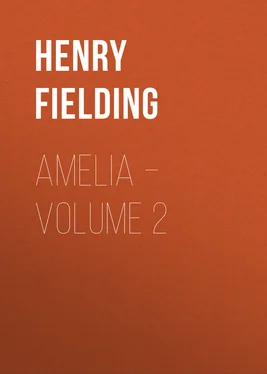Henry Fielding - Amelia – Volume 2
Здесь есть возможность читать онлайн «Henry Fielding - Amelia – Volume 2» — ознакомительный отрывок электронной книги совершенно бесплатно, а после прочтения отрывка купить полную версию. В некоторых случаях можно слушать аудио, скачать через торрент в формате fb2 и присутствует краткое содержание. Жанр: foreign_prose, foreign_antique, на английском языке. Описание произведения, (предисловие) а так же отзывы посетителей доступны на портале библиотеки ЛибКат.
- Название:Amelia – Volume 2
- Автор:
- Жанр:
- Год:неизвестен
- ISBN:нет данных
- Рейтинг книги:4 / 5. Голосов: 1
-
Избранное:Добавить в избранное
- Отзывы:
-
Ваша оценка:
- 80
- 1
- 2
- 3
- 4
- 5
Amelia – Volume 2: краткое содержание, описание и аннотация
Предлагаем к чтению аннотацию, описание, краткое содержание или предисловие (зависит от того, что написал сам автор книги «Amelia – Volume 2»). Если вы не нашли необходимую информацию о книге — напишите в комментариях, мы постараемся отыскать её.
Amelia – Volume 2 — читать онлайн ознакомительный отрывок
Ниже представлен текст книги, разбитый по страницам. Система сохранения места последней прочитанной страницы, позволяет с удобством читать онлайн бесплатно книгу «Amelia – Volume 2», без необходимости каждый раз заново искать на чём Вы остановились. Поставьте закладку, и сможете в любой момент перейти на страницу, на которой закончили чтение.
Интервал:
Закладка:
Henry Fielding
Amelia – Volume 2
BOOK V
Chapter i.
In which the reader will meet with an old acquaintance
Booth's affairs were put on a better aspect than they had ever worn before, and he was willing to make use of the opportunity of one day in seven to taste the fresh air.
At nine in the morning he went to pay a visit to his old friend Colonel James, resolving, if possible, to have a full explanation of that behaviour which appeared to him so mysterious: but the colonel was as inaccessible as the best defended fortress; and it was as impossible for Booth to pass beyond his entry as the Spaniards found it to take Gibraltar. He received the usual answers; first, that the colonel was not stirring, and an hour after that he was gone out. All that he got by asking further questions was only to receive still ruder answers, by which, if he had been very sagacious, he might have been satisfied how little worth his while it was to desire to go in; for the porter at a great man's door is a kind of thermometer, by which you may discover the warmth or coldness of his master's friendship. Nay, in the highest stations of all, as the great man himself hath his different kinds of salutation, from an hearty embrace with a kiss, and my dear lord or dear Sir Charles, down to, well Mr. – , what would you have me do? so the porter to some bows with respect, to others with a smile, to some he bows more, to others less low, to others not at all. Some he just lets in, and others he just shuts out. And in all this they so well correspond, that one would be inclined to think that the great man and his porter had compared their lists together, and, like two actors concerned to act different parts in the same scene, had rehearsed their parts privately together before they ventured to perform in public.
Though Booth did not, perhaps, see the whole matter in this just light, for that in reality it is, yet he was discerning enough to conclude, from the behaviour of the servant, especially when he considered that of the master likewise, that he had entirely lost the friendship of James; and this conviction gave him a concern that not only the flattering prospect of his lordship's favour was not able to compensate, but which even obliterated, and made him for a while forget the situation in which he had left his Amelia: and he wandered about almost two hours, scarce knowing where he went, till at last he dropt into a coffee-house near St James's, where he sat himself down.
He had scarce drank his dish of coffee before he heard a young officer of the guards cry to another, "Od, d – n me, Jack, here he comes – here's old honour and dignity, faith." Upon which he saw a chair open, and out issued a most erect and stately figure indeed, with a vast periwig on his head, and a vast hat under his arm. This august personage, having entered the room, walked directly up to the upper end, where having paid his respects to all present of any note, to each according to seniority, he at last cast his eyes on Booth, and very civilly, though somewhat coldly, asked him how he did.
Booth, who had long recognized the features of his old acquaintance Major Bath, returned the compliment with a very low bow; but did not venture to make the first advance to familiarity, as he was truly possessed of that quality which the Greeks considered in the highest light of honour, and which we term modesty; though indeed, neither ours nor the Latin language hath any word adequate to the idea of the original.
The colonel, after having discharged himself of two or three articles of news, and made his comments upon them, when the next chair to him became vacant, called upon Booth to fill it. He then asked him several questions relating to his affairs; and, when he heard he was out of the army, advised him earnestly to use all means to get in again, saying that he was a pretty lad, and they must not lose him.
Booth told him in a whisper that he had a great deal to say to him on that subject if they were in a more private place; upon this the colonel proposed a walk in the Park, which the other readily accepted.
During their walk Booth opened his heart, and, among other matters, acquainted Colonel Bath that he feared he had lost the friendship of Colonel James; "though I am not," said he, "conscious of having done the least thing to deserve it."
Bath answered, "You are certainly mistaken, Mr. Booth. I have indeed scarce seen my brother since my coming to town; for I have been here but two days; however, I am convinced he is a man of too nice honour to do anything inconsistent with the true dignity of a gentleman." Booth answered, "He was far from accusing him of anything dishonourable." – "D – n me," said Bath, "if there is a man alive can or dare accuse him: if you have the least reason to take anything ill, why don't you go to him? you are a gentleman, and his rank doth not protect him from giving you satisfaction." "The affair is not of any such kind," says Booth; "I have great obligations to the colonel, and have more reason to lament than complain; and, if I could but see him, I am convinced I should have no cause for either; but I cannot get within his house; it was but an hour ago a servant of his turned me rudely from the door." "Did a servant of my brother use you rudely?" said the colonel, with the utmost gravity. "I do not know, sir, in what light you see such things; but, to me, the affront of a servant is the affront of the master; and if he doth not immediately punish it, by all the dignity of a man, I would see the master's nose between my fingers." Booth offered to explain, but to no purpose; the colonel was got into his stilts; and it was impossible to take him down, nay, it was as much as Booth could possibly do to part with him without an actual quarrel; nor would he, perhaps, have been able to have accomplished it, had not the colonel by accident turned at last to take Booth's side of the question; and before they separated he swore many oaths that James should give him proper satisfaction.
Such was the end of this present interview, so little to the content of Booth, that he was heartily concerned he had ever mentioned a syllable of the matter to his honourable friend.
[This chapter occurs in the original edition of Amelia, between 1 and 2. It is omitted later, and would have been omitted here but for an accident. As it had been printed it may as well appear: for though it has no great value it may interest some readers as an additional illustration of Fielding's dislike to doctors. – ED.
Containing a brace of doctors and much physical matter.
He now returned with all his uneasiness to Amelia, whom he found in a condition very little adapted to relieve or comfort him. That poor woman was now indeed under very great apprehensions for her child, whose fever now began to rage very violently: and what was worse, an apothecary had been with her, and frightened her almost out of her wits. He had indeed represented the case of the child to be very desperate, and had prevailed on the mother to call in the assistance of a doctor.
Booth had been a very little time in the room before this doctor arrived, with the apothecary close at his heels, and both approached the bed, where the former felt the pulse of the sick, and performed several other physical ceremonies.
He then began to enquire of the apothecary what he had already done for the patient; all which, as soon as informed, he greatly approved. The doctor then sat down, called for a pen and ink, filled a whole side of a sheet of paper with physic, then took a guinea, and took his leave; the apothecary waiting upon him downstairs, as he had attended him up.
All that night both Amelia and Booth sat up with their child, who rather grew worse than better. In the morning Mrs. Ellison found the infant in a raging fever, burning hot, and very light-headed, and the mother under the highest dejection; for the distemper had not given the least ground to all the efforts of the apothecary and doctor, but seemed to defy their utmost power, with all that tremendous apparatus of phials and gallypots, which were arranged in battle-array all over the room.
Читать дальшеИнтервал:
Закладка:
Похожие книги на «Amelia – Volume 2»
Представляем Вашему вниманию похожие книги на «Amelia – Volume 2» списком для выбора. Мы отобрали схожую по названию и смыслу литературу в надежде предоставить читателям больше вариантов отыскать новые, интересные, ещё непрочитанные произведения.
Обсуждение, отзывы о книге «Amelia – Volume 2» и просто собственные мнения читателей. Оставьте ваши комментарии, напишите, что Вы думаете о произведении, его смысле или главных героях. Укажите что конкретно понравилось, а что нет, и почему Вы так считаете.












